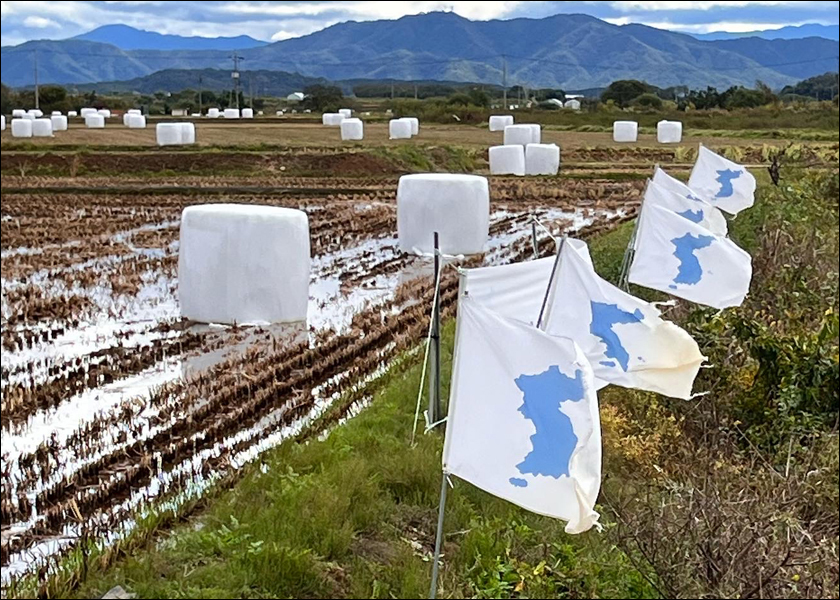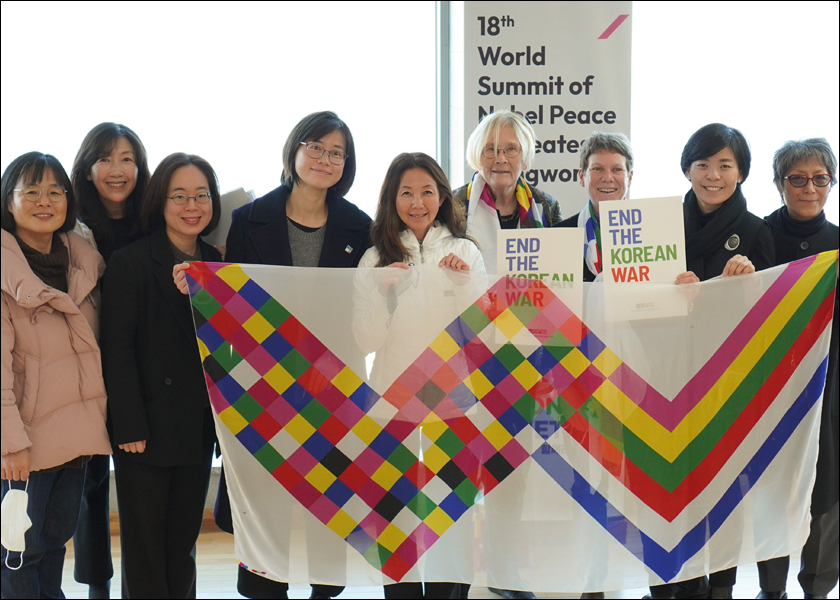Korean American peace activist denied entry to South Korea: No reason given | By Martha Vickery (Fall 2024)

The timing was like a mean pre-Halloween trick on October 30 when peace activist Christine Ahn was ready to board a plane in Honolulu bound for Seoul, for a couple weeks of meetings with activists and government; the highlight was a keynote speech for a youth peace conference in Gyeonggi-do.
When she got to the airport, she was denied a boarding pass by Asiana Airlines, and told that she had been banned from entering South Korea, no reason or explanation given.
It was not the first time that Ahn, a prominent Korea peace and reunification activist and co-founder of the women’s peace advocacy organization Women Cross DMZ, has been denied entry into South Korea, however, it was still unexpected. During the Trump administration, another time of heightened tensions between the two Koreas, Ahn had been banned from entering the country, but the ban was reversed under President Jae-in Moon’s administration (2017 to 2022).
Ahn said she has travelled to South Korea twice since the current conservative president, Suk-yeol Yoon, was elected in 2022. There was no reason for her to think this trip would be upended. The denial of entry into the country “comes as a huge surprise,” she said.
“They are so opaque,” she said of the current South Korean administration. “They gave no explanation, but we can just assume they are haphazardly applying the National Security Law, and because I visited North Korea, because I help with trying to establish connection between the U.S. and the DPRK, and because I visit the (DPRK’s) UN Mission in New York,” she said. “The problem with the National Security Law is that it is so inconsistently applied, and for some reason, they decided to deny my entry this time.”
Although the South Korean government’s actions seem opaque, Ahn’s assumption about the application of the National Security Law is based on her experience. After the famous 2015 crossing of the DMZ, Ahn and other women who crossed from North to South received formal letters once they got to South Korea, warning them that if she or any of the march participants “said anything politically controversial in violation of the National Security Law, I would be deported,” she said. “It shows how arcane the law is, and the fact that it serves to suppress free speech.”
Along with the Women Cross DMZ attorney, Ahn said she immediately got in touch with the State Department, which will try to obtain a formal justification from the South Korean consulate on why she was barred from entering South Korea.
The National Security Law, which Ahn presumes is being used as justification for denying her entry to South Korea, was established in South Korea after the division of Korea into separately governed states, ostensibly to suppress influences from North Korea. Critics of the law have said that it has also been used to suppress legitimate government opposition, and to quash free speech. Over the years, the law has variously been used to put pressure on organized labor, peace activism, the press and media, and even to ban artwork and other creative endeavors. The current South Korean Yoon administration is conservative, and in the past, other conservative administrations have enforced the National Security Law in various ways.
Ahn said that, under the Yoon administration, there have been numerous recent attempts to oppress peace activism and suppress advocacy for marginalized groups. She cited a recent attempt by the government to abolish the office of the Minister of Gender Equality.
Recent reports from Korea watchers have cited other repressive actions. A September 2023 story in The New Yorker reported that police raided dozens of union offices and private homes, accusing labor officials of violating South Korea’s National Security Act and (illegally) coercing construction firms to use union workers. The same story reported that prosecutors working for the Yoon administration “have used their investigatory powers to intimidate and threaten to arrest politicians in the liberal opposition party.” One of those politicians was Jae-myung Lee, who ran against Yoon in 2022.

Ahn is the co-director and co-founder of the non-profit group Women Cross DMZ, which began in 2014 and carried out an event over several weeks in 2015 with women’s peace activists in both North Korea and South Korea. The highlight of the event was a crossing from North Korea to South Korea by an international group of 30 women activists, including several Nobel peace laureates, over the Demilitarized Zone (DMZ), the heavily-guarded boundary between the two Koreas.
Since its founding, Women Cross DMZ has been advancing a message that women’s input is key to peacemaking, and that an end to the Korean War should be formalized with a peace treaty.
Since the 2015 event, the movement started by Women Cross DMZ has expanded internationally, through a coalition known as Korea Peace Now. Women Cross DMZ has reported on how the U.S. policies toward North Korea — which include sanctions, isolation, and military threats — have not advanced peace and stability between the two Koreas, but rather have heightened tensions and increased the risk of renewed conflict.
Women Cross DMZ and Korea Peace Now have consistently advocated for more effective diplomacy and more people-to-people engagement. This advocacy has earned widespread support from Nobel Peace laureates, the former UN Special Rapporteur on DPRK human rights, humanitarian workers, prominent feminist activists, and even former U.S. military leaders. In 2022, Ahn was conferred the Social Activist Award at the 18th Annual Summit of Nobel Peace Laureates, held in Pyeongchang, South Korea.
In October, Ahn collaborated in a Chicago Tribune commentary with Dan Leaf, a retired Air Force lieutenant general and a former deputy commander of the U.S. Indo-Pacific Command. Their essay said the next president must provide realistic off-ramps to war with North Korea, in contrast to the tough talk and ultimatums expressed by the Biden Administration, and by Harris on the campaign trail.
They wrote that the next president must forge a peace treaty that will end the Korean War formally, end the Trump-era travel ban to North Korea that is preventing elderly Korean “more of the same” approach to dealing with North Korea, which has only increased North Koreans’ suffering and driven the U.S, and North Korea closer to war.
In addition having to cancel her keynote address to the International Youth Peace Forum in Gyeonggi Province, Ahn has been re-scheduling meetings with journalists and leaders in the South Korean peace movement, and with National Assembly members.
Ahn also has family in South Korea, and had set aside time to visit a shrine to her parents, and attend a family event to remember an uncle who recently died. “This has been heartbreaking in so many ways,” Ahn said.
At the time of the interview, Ahn was still in the dark about the reason she was singled out. She jokes that it could be her imposing physical presence. “You’ve seen me, and all five feet and 100 pounds of me – it is quite terrifying,” she remarked.
However, the Yoon government’s behavior is becoming a disturbing pattern, she added. “They like to tout defending democracy and freedom, and yet they are quite renowned now for repressing labor activists, and peace movement and reunification activists, so it is quite a dark time for civil society.”
To sign a petition to lift the travel ban, click here.


